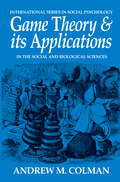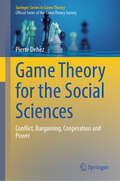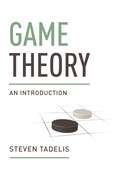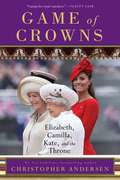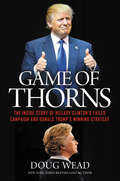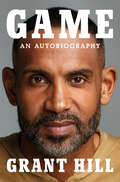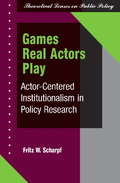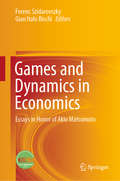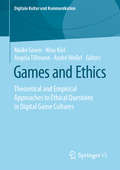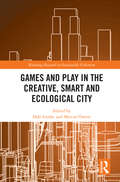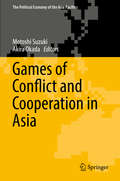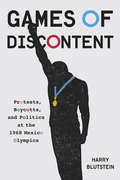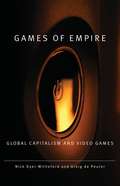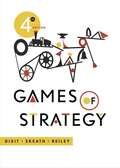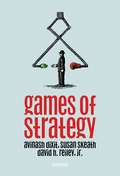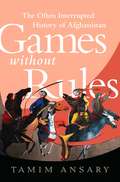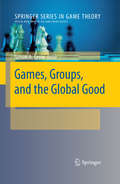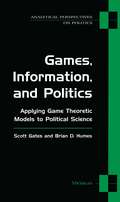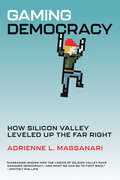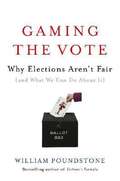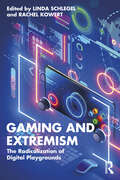- Table View
- List View
Game Theory and its Applications: In the Social and Biological Sciences (International Series In Social Psychology Ser.)
by Andrew M. ColmanAndrew Coleman provides an accessible introduction to the fundamentals of mathematical gaming and other major applications in social psychology, decision theory, economics, politics, evolutionary biology, philosophy, operational research and sociology.
Game Theory for the Social Sciences: Conflict, Bargaining, Cooperation and Power (Springer Series in Game Theory)
by Pierre DehezThis textbook introduces fundamental concepts of game theory and demonstrates its uses and application in the social sciences. Written in plain English and without overwhelming mathematical jargon, it serves as an invaluable resource for undergraduate students in economics, law, political sciences, and related social sciences. Starting from non-cooperative games and progressing to cooperative games, it explores a wide range of topics, including the analysis of zero-sum games, voting rules and their practical implications, and other applications of game theory. Uniquely, it emphasizes cooperative concepts and their normative applications, providing a fresh perspective. With "Game Theory for the Social Sciences", readers will be equipped with the analytical tools to analyze conflict resolution, bargaining strategies, cooperative decision-making, and the dynamics of power relationships. Through engaging examples drawn from real-world scenarios, readers will develop a solid understanding of how game theory can be applied to diverse fields in social sciences. “Pierre Dehez offers a consistent kit of classic game theoretic tools, from equilibrium concepts to bargaining solutions and power indices, all illustrated with insightful examples and applications.” Françoise Forges, Professor of Economics, Université Paris Dauphine-PSL “This book is written clearly and pedagogically without resorting to difficult mathematics. It provides many different and interesting examples from problems of fair sharing, bargaining to voting systems and many others. It is a perfect introduction to this subject too often quoted but too often misunderstood.” Alan Kirman, Directeur d’études, Ecole des Hautes Etudes en Sciences Sociales, Paris, and Emeritus Professor, Aix-Marseille University
Game Theory: An Introduction
by Steven TadelisThe definitive introduction to game theoryThis comprehensive textbook introduces readers to the principal ideas and applications of game theory, in a style that combines rigor with accessibility. Steven Tadelis begins with a concise description of rational decision making, and goes on to discuss strategic and extensive form games with complete information, Bayesian games, and extensive form games with imperfect information. He covers a host of topics, including multistage and repeated games, bargaining theory, auctions, rent-seeking games, mechanism design, signaling games, reputation building, and information transmission games. Unlike other books on game theory, this one begins with the idea of rationality and explores its implications for multiperson decision problems through concepts like dominated strategies and rationalizability. Only then does it present the subject of Nash equilibrium and its derivatives.Game Theory is the ideal textbook for advanced undergraduate and beginning graduate students. Throughout, concepts and methods are explained using real-world examples backed by precise analytic material. The book features many important applications to economics and political science, as well as numerous exercises that focus on how to formalize informal situations and then analyze them.Introduces the core ideas and applications of game theoryCovers static and dynamic games, with complete and incomplete informationFeatures a variety of examples, applications, and exercisesTopics include repeated games, bargaining, auctions, signaling, reputation, and information transmissionIdeal for advanced undergraduate and beginning graduate studentsComplete solutions available to teachers and selected solutions available to students
Game of Crowns: Elizabeth, Camilla, Kate, and the Throne
by Christopher AndersenThe #1 New York Times bestselling author of William and Kate and The Day Diana Died takes a compulsively readable look into the relationships and rivalries of Queen Elizabeth, Camilla Parker Bowles, and Kate Middleton.<P><P> One has been famous longer than anyone on the planet--a wily stateswoman and an enduring symbol of a fading institution. One is the great-granddaughter of a king's mistress and a celebrated homewrecker who survived a firestorm of scorn to marry her lover and replace her arch rival, a beloved twentieth-century figure. One is a beautiful commoner, the university-educated daughter of a self-made entrepreneur, a fashion idol, and wife and mother to two future kings. <P> Master biographer Christopher Andersen takes readers behind palace walls to examine the surprising similarities and stark differences among three remarkable women--Queen Elizabeth; Camilla, Duchess of Cornwall; and Princess Kate. Andersen reveals what transpires within the royal family away from the public's prying eyes; how the women actually feel about each other; how they differ as lovers, wives, and mothers; and how they are reshaping the landscape of the monarchy in this addictive read that will shock even those who are spellbound by the royal palace. <P><b>A New York Times Bestseller</b>
Game of Thorns: The Inside Story of Hillary Clinton's Failed Campaign and Donald Trump's Winning Strategy
by Doug WeadHere is the first, insider, account of the precipitous fall of Hillary Clinton. How the scandals of a lifetime finally reached critical mass. How, in the last few days of the campaign, some on her staff saw the ghostly shroud of defeat creeping over them but were helpless to act, frozen by the self-denial of the group. Here is an explanation of why the national media and their corporate owners kept Joe Biden and Elizabeth Warren out of the race. Why they wanted their investment in the Clinton's to work and how they were willing to go to great lengths to make that happen. Don't have time to read the thousands of leaked emails from inside the Clinton machine? The author has done it for you and has come back from the experience with a stunning peek into the world of a political leader who privately declared that she wanted a hemisphere "with open trade and open borders." Finally, here is the story of the rise of Donald Trump. How his opponents sought to derail him. This is the story of how Donald Trump's message and brand transcended the traps laid by his enemies. How, against all odds, he won the presidency. And here are the details of his plan to make American great again.
Game: An Autobiography
by Grant HillThe full, frank story of a remarkable life&’s journey—to the pinnacle of success as a basketball player, icon, and entrepreneur, to the depths of personal trauma and back, to a place of flourishing and peace—made possible above all by a family&’s loveGrant Hill always had game. His choice of college was a subject of national interest, and his arrival at Duke University cemented the program&’s arrival at the top. In his freshman year, he led the team to its first NCAA championship, and three championship appearances in four years. His Duke career produced some of the most iconic moments in college basketball history, and Coach K proved to be a lifelong mentor. Later, as one of the NBA&’s best players and a new face of the Detroit Pistons franchise, Hill was the first person with the potential to give Michael Jordan a run for his money, not just as a player but as a brand. His $45 million rookie contract was almost the least of it. He turned down Nike for Fila, and soon Method Man and Tupac Shakur were wearing his shoes. Hill writes candidly about all of it, including the transactional impermanence of life in the league and the isolation caused by his growing fame. His parents and friends helped ground him, and eventually he met a gifted musician named Tamia. The love he found with her and the arrival of their two beautiful daughters would be his rock as a brutal and mysterious injury sidelined him, coinciding with his wife&’s own serious health struggles. With openness and insight, Hill relates his entire path, including post-career highlights like his Hall of Fame induction, co-ownership of the Atlanta Hawks, the directorship of the USA Basketball Men&’s National Team, and even a yearly gig calling the Final Four. Hill&’s father, Calvin, used to tell him that there were always a lot of reasons but never any excuses, and Game is a distillation of a lifetime&’s effort to understand the reasons—the good and the bad. At his hardest moments, Hill sought out wisdom from others, stories of inspiration and overcoming obstacles. Now, with Game, he has returned the favor.
Games Real Actors Play
by Fritz W ScharpfGames Real Actors Playprovides a persuasive argument for the use of basic concepts of game theory in understanding public policy conflicts. Fritz Scharpf criticizes public choice theory as too narrow in its examination of actor motives and discursive democracy as too blind to the institutional incentives of political parties. With the nonspecialist in mind, the author presents a coherent actor-centered model of institutional rational choice that integrates a wide variety of theoretical contributions, such as game theory, negotiation theory, transaction cost economics, international relations, and democratic theory. Games Real Actors Playoffers a framework for linking positive theory to the normative issues that necessarily arise in policy research and employs many cross-national examples, including a comparative use of game theory to understand the differing reactions of Great Britain, Sweden, Austria, and the Federal Republic of Germany to the economic stagflation of the 1970s.
Games Real Actors Play
by Fritz W ScharpfGames Real Actors Play provides a persuasive argument for the use of basic concepts of game theory in understanding public policy conflicts. Fritz Scharpf criticizes public choice theory as too narrow in its examination of actor motives and discursive democracy as too blind to the institutional incentives of political parties. With the nonspecialist in mind, the author presents a coherent actor-centered model of institutional rational choice that integrates a wide variety of theoretical contributions, such as game theory, negotiation theory, transaction cost economics, international relations, and democratic theory.Games Real Actors Play offers a framework for linking positive theory to the normative issues that necessarily arise in policy research and employs many cross-national examples, including a comparative use of game theory to understand the differing reactions of Great Britain, Sweden, Austria, and the Federal Republic of Germany to the economic stagflation of the 1970s.
Games Real Actors Play
by Fritz W ScharpfGames Real Actors Play provides a persuasive argument for the use of basic concepts of game theory in understanding public policy conflicts. Fritz Scharpf criticizes public choice theory as too narrow in its examination of actor motives and discursive democracy as too blind to the institutional incentives of political parties. With the nonspecialist in mind, the author presents a coherent actor-centered model of institutional rational choice that integrates a wide variety of theoretical contributions, such as game theory, negotiation theory, transaction cost economics, international relations, and democratic theory. Games Real Actors Play offers a framework for linking positive theory to the normative issues that necessarily arise in policy research and employs many cross-national examples, including a comparative use of game theory to understand the differing reactions of Great Britain, Sweden, Austria, and the Federal Republic of Germany to the economic stagflation of the 1970s.
Games Real Actors Play
by Fritz W ScharpfGames Real Actors Play provides a persuasive argument for the use of basic concepts of game theory in understanding public policy conflicts. Fritz Scharpf criticizes public choice theory as too narrow in its examination of actor motives and discursive democracy as too blind to the institutional incentives of political parties. With the nonspecialist in mind, the author presents a coherent actor-centered model of institutional rational choice that integrates a wide variety of theoretical contributions, such as game theory, negotiation theory, transaction cost economics, international relations, and democratic theory.Games Real Actors Play offers a framework for linking positive theory to the normative issues that necessarily arise in policy research and employs many cross-national examples, including a comparative use of game theory to understand the differing reactions of Great Britain, Sweden, Austria, and the Federal Republic of Germany to the economic stagflation of the 1970s.
Games Real Actors Play: Actor-centered Institutionalism In Policy Research
by Fritz W ScharpfGames Real Actors Play provides a persuasive argument for the use of basic concepts of game theory in understanding public policy conflicts. Fritz Scharpf criticizes public choice theory as too narrow in its examination of actor motives and discursive democracy as too blind to the institutional incentives of political parties. With the nonspecialist in mind, the author presents a coherent actor-centered model of institutional rational choice that integrates a wide variety of theoretical contributions, such as game theory, negotiation theory, transaction cost economics, international relations, and democratic theory.Games Real Actors Play offers a framework for linking positive theory to the normative issues that necessarily arise in policy research and employs many cross-national examples, including a comparative use of game theory to understand the differing reactions of Great Britain, Sweden, Austria, and the Federal Republic of Germany to the economic stagflation of the 1970s.
Games and Dynamics in Economics: Essays in Honor of Akio Matsumoto
by Ferenc Szidarovszky Gian Italo BischiThis book focuses on the latest advances in nonlinear dynamic modeling in economics and finance, mainly—but not solely—based on the description of strategic interaction by using concepts and methods from dynamic and evolutionary game theory. The respective chapters cover a range of theoretical issues and examples concerning how the qualitative theory of dynamical systems is used to analyze the local and global bifurcations that characterize complex behaviors observed in social systems where heterogeneous and boundedly rational economic agents interact. Nonlinear dynamical systems, represented by difference and differential and functional equations, are extensively used to simulate the behavior of time-evolving economic systems, also in the presence of time lags, discontinuities, and hysteresis phenomena. In addition, some theoretical issues and particular applications are discussed, as well. The contributions gathered here offer an up-to-date review of the latest research in this rapidly developing research area.
Games and Ethics: Theoretical and Empirical Approaches to Ethical Questions in Digital Game Cultures (Digitale Kultur und Kommunikation #7)
by Angela Tillmann Maike Groen Nina Kiel André WeßelThe number of digital gamers is increasing worldwide, but public debates about digital games commonly focus on questionable game content or problematic gaming behavior. This book offers a broader ethical perspective on digital game cultures, presenting theoretical and empirical work on the ethical dimensions of the development, production and distribution of digital games, as well as issues relating to responsible gaming and the pedagogical use of digital games. Questions of the communicative-cultural change in game cultures are linked with questions of media education and media ethics. With such a comprehensive approach, the volume promotes ethical discourse on digital game cultures.
Games and Play in the Creative, Smart and Ecological City (Routledge Research in Sustainable Urbanism)
by Dale Leorke Marcus OwensThis book explores what games and play can tell us about contemporary processes of urbanization and examines how the dynamics of gaming can help us understand the interurban competition that underpins the entrepreneurialism of the smart and creative city. Game and Play in the Creative, Smart and Ecological City is a collection of chapters written by an interdisciplinary group of scholars from game studies, media studies, play studies, architecture, landscape architecture and urban planning. It situates the historical evolution of play and games in the urban landscape and outlines the scope of the various ways games and play contribute to the city’s economy, cultural life and environmental concerns. In connecting games and play more concretely to urban discourses and design strategies, this book urges scholars to consider their growing contribution to three overarching sets of discourses that dominate urban planning and policy today: the creative and cultural economies of cities; the smart and playable city; and ecological cities. This interdisciplinary work will be of great interest to students and scholars of game studies, play studies, landscape architecture (and allied design fields), urban geography, and art history.
Games of Conflict and Cooperation in Asia
by Motoshi Suzuki Akira OkadaThis edited volume is an outcome of the first major collaborative project between Japanese economists and political scientists, funded by the Japan Society for the Promotion of Science. The authors of the individual chapters show that Asian states play games of conflict and cooperation strategically by creating, changing, or destroying institutions. For them, conflict and cooperation are inseparable phenomena and are integral parts of states' strategic interactions under constraints. Through the establishment of appropriate institutions that coordinate states' actions, present conflict can be turned into stable cooperation in the future. No discernible difference exists in the extent of rationality between the East and the West, but substantial variations between regions or even within a region are found in institutions that are influenced by history and culture. Historical and cultural variations divide contemporary Asia, making regional institutional cooperation difficult and prompting some Asian states to use global or inter-regional arrangements in order to obtain benefits of cooperation. Qualifications are provided for this line of argument in the first chapter, which also discusses the affinity of international relations theory and game theory, with special attention to Japan and Asia. The following ten substantive chapters are developed based on the conceptual framework and, for integrity and coherence, are sub-grouped into four parts that correspond to major issues in international relations scholarship: (1) conflict management, (2) arms control, (3) trade, and (4) currency.
Games of Discontent: Protests, Boycotts, and Politics at the 1968 Mexico Olympics (McGill-Queen's Studies in Protest, Power, and Resistance)
by Harry BlutsteinThe year 1968 was ablaze with passion and mayhem as protests erupted in Paris and Prague, throughout the United States, and in cities on all continents. The Summer Olympic Games in Mexico were to be a moment of respite from chaos. But the image of peace – a white dove – adopted by organizers was an illusion, as was obvious to a record six hundred million people watching worldwide on satellite television. Ten days before the opening ceremony, soldiers slaughtered hundreds of student protesters in the capital.In Games of Discontent Harry Blutstein presents vivid accounts of threatened boycotts to protest racism in the United States, South Africa, and Rhodesia. He describes demonstrations by Czechoslovak gold medal gymnast Věra Čáslavská against the Soviet-led invasion of her country. The most dramatic moment of the Olympic Games was Tommie Smith and John Carlos's black power salute from the podium. Blutstein furnishes new details behind their protest and examines how this iconic image seared itself into historical memory, inspiring Colin Kaepernick and a new generation of athlete-activists to take a knee against racism decades later.The 1968 Summer Games became a microcosm of the discord happening around the globe. Describing a range of protest activities preceding and surrounding the 1968 Olympics, Games of Discontent shines light on the world during a politically transformative moment when discontents were able, for the first time, to globalize their protests.
Games of Empire: Global Capitalism and Video Games (Electronic Mediations #29)
by Nick Dyer-Witheford Greig de PeuterIn the first decade of the twenty-first century, video games are an integral part of global media culture, rivaling Hollywood in revenue and influence. No longer confined to a subculture of adolescent males, video games today are played by adults around the world. At the same time, video games have become major sites of corporate exploitation and military recruitment.In Games of Empire, Nick Dyer-Witheford and Greig de Peuter offer a radical political critique of such video games and virtual environments as Second Life, World of Warcraft, and Grand Theft Auto, analyzing them as the exemplary media of Empire, the twenty-first-century hypercapitalist complex theorized by Michael Hardt and Antonio Negri. The authors trace the ascent of virtual gaming, assess its impact on creators and players alike, and delineate the relationships between games and reality, body and avatar, screen and street. Games of Empire forcefully connects video games to real-world concerns about globalization, militarism, and exploitation, from the horrors of African mines and Indian e-waste sites that underlie the entire industry, the role of labor in commercial game development, and the synergy between military simulation software and the battlefields of Iraq and Afghanistan exemplified by Full Spectrum Warrior to the substantial virtual economies surrounding World of Warcraft, the urban neoliberalism made playable in Grand Theft Auto, and the emergence of an alternative game culture through activist games and open-source game development.Rejecting both moral panic and glib enthusiasm, Games of Empire demonstrates how virtual games crystallize the cultural, political, and economic forces of global capital, while also providing a means of resisting them.
Games of Strategy
by Avinash K. Dixit Susan Skeath David H. ReileyGames of Strategy, famous for its simple yet accurate exposition and its great examples and exercises, has been extensively revised for this Fourth Edition. The key to its broad success is that the authors assume no prior knowledge of game theory and present the material in the most accessible way possible. With new and improved features and compelling end-of-chapter exercises, this Fourth Edition of Games of Strategy continues to engage students around the world.
Games of Strategy (3rd Edition)
by Susan Skeath David Reiley Avinash DixitThe third edition uses resonant, real-world examples to simplify complex theoretical ideas, helping students see the value of strategic thinking in a variety of situations.
Games without Rules: The Often-Interrupted History of Afghanistan
by Tamim AnsaryToday, most Westerners still see the war in Afghanistan as a contest between democracy and Islamist fanaticism. That war is real; but it sits atop an older struggle, between Kabul and the countryside, between order and chaos, between a modernist impulse to join the world and the pull of an older Afghanistan: a tribal universe of village republics permeated by Islam.<P><P> Now, Tamim Ansary draws on his Afghan background, Muslim roots, and Western and Afghan sources to explain history from the inside out, and to illuminate the long, internal struggle that the outside world has never fully understood. It is the story of a nation struggling to take form, a nation undermined by its own demons while, every 40 to 60 years, a great power crashes in and disrupts whatever progress has been made. Told in conversational, storytelling style, and focusing on key events and personalities, Games without Rules provides revelatory insight into a country at the center of political debate.
Games, Groups, and the Global Good
by Simon A. LevinHow do groups form, how do institutions come into being, and when do moral norms and practices emerge? This volume explores how game-theoretic approaches can be extended to consider broader questions that cross scales of organization, from individuals to cooperatives to societies. Game theory' strategic formulation of central problems in the analysis of social interactions is used to develop multi-level theories that examine the interplay between individuals and the collectives they form. The concept of cooperation is examined at a higher level than that usually addressed by game theory, especially focusing on the formation of groups and the role of social norms in maintaining their integrity, with positive and negative implications. The authors suggest that conventional analyses need to be broadened to explain how heuristics, like concepts of fairness, arise and become formalized into the ethical principles embraced by a society.
Games, Information, and Politics: Applying Game Theoretic Models to Political Science
by Scott Gates Brian D. HumesTo study the strategic interaction of individuals, we can use game theory. Despite the long history shared by game theory and political science, many political scientists remain unaware of the exciting game theoretic techniques that have been developed over the years. As a result they use overly simple games to illustrate complex processes. Games, Information, and Politicsis written for political scientists who have an interest in game theory but really do not understand how it can be used to improve our understanding of politics. To address this problem, Gates and Humes write for scholars who have little or no training in formal theory and demonstrate how game theoretic analysis can be applied to politics. They apply game theoretic models to three subfields of political science: American politics, comparative politics, and international relations. They demonstrate how game theory can be applied to each of these subfields by drawing from three distinct pieces of research. By drawing on examples from current research projects the authors use real research problems--not hypothetical questions--to develop their discussion of various techniques and to demonstrate how to apply game theoretic models to help answer important political questions. Emphasizing the process of applying game theory, Gates and Humes clear up some common misperceptions about game theory and show how it can be used to improve our understanding of politics. Games, Information, and Politicsis written for scholars interested in understanding how game theory is used to model strategic interactions. It will appeal to sociologists and economists as well as political scientists. Scott Gates is Assistant Professor of Political Science, Michigan State University. Brian D. Humes is Associate Professor of Political Science, University of Nebraska-Lincoln.
Gaming Democracy: How Silicon Valley Leveled Up the Far Right
by Adrienne L. MassanariHow play and gaming culture have mainstreamed far right ideology through social media platforms.From #Gamergate to the ongoing Big Lie, the far right has gone mainstream. In Gaming Democracy, Adrienne Massanari tracks the flames of toxicity found in the far right and &“alt-right&” movements as they increasingly take up oxygen in American and global society. In this pathbreaking contribution to the fields of internet studies, game studies, and gender studies, Massanari argues that Silicon Valley&’s emphasis on meritocracy and free speech absolutism has driven this rightward slide. These ideologies have been coded into social media spaces that implicitly silence marginalized communities and subject them to rampant abuse by groups that have learned to &“game&” the ecology of platforms, algorithms, and attention economies.While populist movements are not new, phenomena such as QAnon, parental rights activism, and COVID denialism are uniquely &“of the internet,&” with supporters demonstrating both technical acumen and an ability to use memes and play as a way of both building community and fomenting dissent. Massanari explores the ways that the far right uses memetic humor and geek masculinity as tools both to create a sense of community within these leaderless groups and to obfuscate their intentions. Using the lens of play and game studies as well as the concept of &“metagaming,&” Gaming Democracy is a novel contribution to our understanding of online platforms and far right political activism.
Gaming The Vote: Why Elections Aren't Fair (and What We Can Do About It)
by William PoundstoneAt least five U.S. presidential elections have been won by the second most popular candidate, because of "spoilers"--Minor candidates who take enough votes away from the most popular candidate to tip the election. The spoiler effect is a consequence of the "impossibility theorem," discovered by Nobel laureate economist Kenneth Arrow, which asserts that voting is fundamentally unfair--and political strategists are exploiting the mathematical faults of the simple majority vote. This book presents a solution to the spoiler problem: a system called range voting, already widely used on the Internet, which is the fairest voting method of all, according to computer studies. Range voting remains controversial, however, and author Poundstone assesses the obstacles confronting any attempt to change the American electoral system
Gaming and Extremism: The Radicalization of Digital Playgrounds
by Rachel Kowert Linda SchlegelCharting the increase in the use of games for the dissemination of extremist propaganda, radicalization, recruitment, and mobilization, this book examines the "gamification of extremism."Editors Linda Schlegel and Rachel Kowert bring together a range of insights from world-leading experts in the field to provide the first comprehensive overview of gaming and extremism. The potential nexus between gaming and extremism has become a key area of concern for researchers, policymakers, and practitioners seeking to prevent and counter radicalization and this book offers insights into key trends and debates, future directions, and potential prevention efforts. This includes the exploration of how games and game adjacent spaces, such as Discord, Twitch, Steam, and DLive, are being leveraged by extremists for the purposes of radicalization, recruitment, and mobilization. Additionally, the book presents the latest counterterrorism techniques, surveys promising preventing/countering violent extremism (P/CVE) measures currently being utilized in the gaming sphere, and examines the ongoing challenges, controversies, and current gaps in knowledge in the field.This text will be of interest to students and scholars of gaming and gaming culture, as well as an essential resource for researchers and practitioners working in prevention and counter-extremism, professionals working at gaming-related tech companies, and policymakers.The Open Access version of this book, available at www.taylorfrancis.com, has been made available under a Creative Commons Attribution-Non Commercial-No Derivatives 4.0 license.
